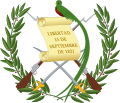| This article is part of a series on |
| Politics of Guatemala |
|---|
 |
Parliamentary elections were held in Guatemala between 24 and 26 January 1947 in order to elect half the seats in Congress. The Revolutionary Action Party won a plurality of seats.
| This article is part of a series on |
| Politics of Guatemala |
|---|
 |
Parliamentary elections were held in Guatemala between 24 and 26 January 1947 in order to elect half the seats in Congress. The Revolutionary Action Party won a plurality of seats.
| Party | Seats | |
|---|---|---|
| Revolutionary Action Party | 29 | |
| Workers Republican-Democratic party | 5 | |
| Total | 34 | |